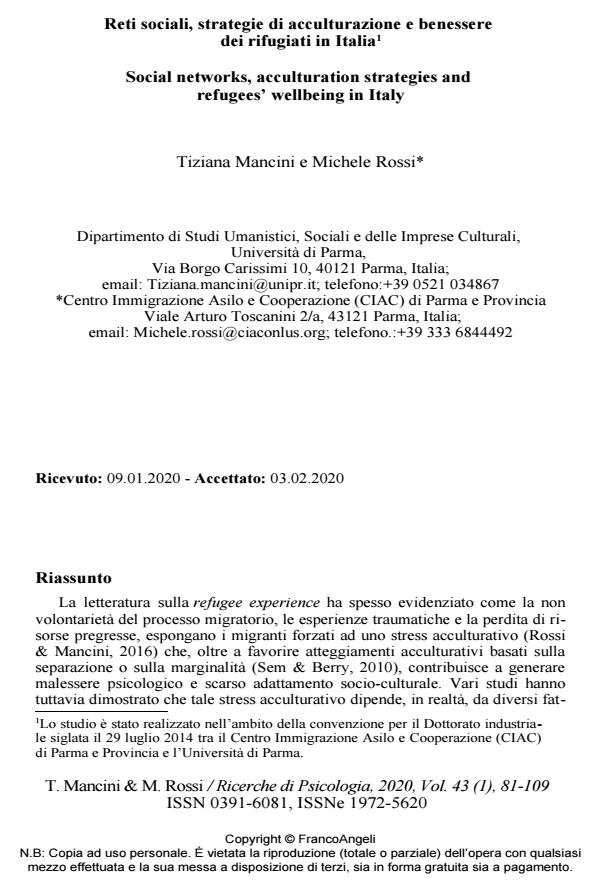Social networks, acculturation strategies and refugees’ wellbeing in Italy
Journal title RICERCHE DI PSICOLOGIA
Author/s Tiziana Mancini, Michele Rossi
Publishing Year 2020 Issue 2020/1
Language Italian Pages 29 P. 81-109 File size 321 KB
DOI 10.3280/RIP2020-001005
DOI is like a bar code for intellectual property: to have more infomation
click here
Below, you can see the article first page
If you want to buy this article in PDF format, you can do it, following the instructions to buy download credits

FrancoAngeli is member of Publishers International Linking Association, Inc (PILA), a not-for-profit association which run the CrossRef service enabling links to and from online scholarly content.
The literature on the refugee experience has often highlighted how the nonvoluntary nature of the migration process, the traumatic experiences and the resources loss, expose migrants to acculturative stress (Rossi & Mancini, 2016). Acculturative stress promotes attitudes of separation or marginality (Sem & Berry, 2010), which in turn contribute to generating psychological disease and poor socio-cultural adaptation. However, various studies have shown that this acculturative stress in related to several factors and, among these, also on the personal, social and contextual resources to which forced migrants can draw once they arrive in the host context (Rossi, 2018). Focusing on social resources, this study analyzed how the frequency of contacts, the cultural heterogeneity and the emotional closeness of the social network in the host country is related both to the acculturation attitudes and the to the psychological well-being of forced migrants in Italy. A semi-structured interview composed of Name generator, Acculturation Attitudes Scale and Kessler Psychological Distress Scale were administered to a sample of 160 forced migrants (refugees = 111; Males = 123, Mage = 29.96). The path analysis showed that, by promoting integration, it was above all cultural heterogeneity and the emotional closeness of the social network that increased the migrants’ psychological well-being
Keywords: Refugee experience, social networks, acculturation, wellbeing, forced migrants.
- Digital Communication at the Time of COVID-19: Relieve the Refugees’ Psychosocial Burden and Protect Their Wellbeing Tiziana Mancini, Chiara Imperato, Silvia Vesco, Michele Rossi, in Journal of Refugee Studies /2022 pp.511
DOI: 10.1093/jrs/feab082 - Migrazioni e psicologie. Introduzione al Forum Alessandro Antonietti, Antonella Marchetti, in RICERCHE DI PSICOLOGIA 1/2020 pp.13
DOI: 10.3280/RIP2020-001002 - The experience of a multidisciplinary team in welcoming vulnerable migrants in a rural Italian reception centre: a study using multidimensional textual analysis Mariachiara Figura, Gianluca Pucciarelli, Silvio Simeone, Paola Arcadi, Bartosz Uchmanowicz, Ercole Vellone, Rosaria Alvaro, in BMC Nursing 957/2025
DOI: 10.1186/s12912-025-03588-7 - The relationship between acculturation and relevant correlates for Sub-Saharan and North African-born migrants: A meta-analytic review Christine Deslandes, Leah M. Kaufmann, Joel R. Anderson, in International Journal of Intercultural Relations 101928/2024 pp.101928
DOI: 10.1016/j.ijintrel.2023.101928 - Living in a multicultural context: Health and integration from the perspective of undocumented Mediterranean migrants, residents, and stakeholders in Italy. A qualitative‐multimethod study Mariachiara Figura, Paola Arcadi, Ercole Vellone, Gianluca Pucciarelli, Silvio Simeone, Loredana Piervisani, Rosaria Alvaro, in Journal of Advanced Nursing /2024 pp.3382
DOI: 10.1111/jan.16036
Tiziana Mancini, Michele Rossi, Reti sociali, strategie di acculturazione e benessere dei rifugiati in Italia in "RICERCHE DI PSICOLOGIA " 1/2020, pp 81-109, DOI: 10.3280/RIP2020-001005